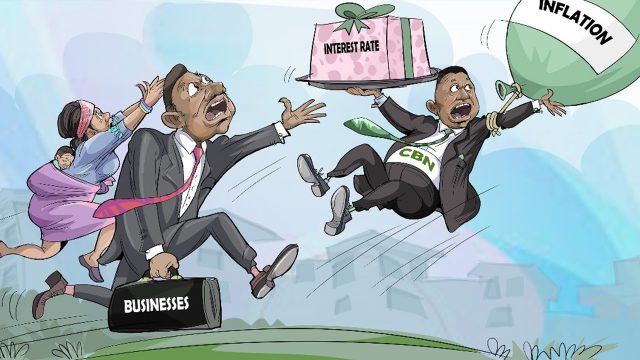Nigeria heading in direction of Zimbabwe, Venezuela, Adebajo warns
Members of the Organised Private Sector (OPS), the Lagos Chamber of Commerce and Industry (LCCI), and the Manufacturers Association of Nigeria (MAN) have expressed displeasure against Tuesday’s decision by the Central Bank of Nigeria (CBN) to raise the Monetary Policy Rate (MPR) by 50 basis points, bringing it from 26.25 per cent to 26.75 per cent .
This they said is coming on the heels of escalating inflation and surging food prices as more businesses are at risk of shutting down.
According to them, despite the continuous increase in MPR over the past two years resulting in a weighty 1,475 basis point hike from 11.5 per cent in May 2022 to 26.25 per cent in May 2024, inflation has remained persistently high, reaching a staggering 34.19 per cent in June, the highest since March 1996.
Clearly, they said, the new rate will further constrain the growth of the manufacturing sector, as the purchasing power of consumers, production levels, competitiveness and sales will further decline.
LCCI’s Director-General, Dr Chinyere Almona, said they are extremely worried about the broader implications of this rate hike on the business community and the overall economic landscape. She urged the government and CBN to consider a more balanced approach to monetary policy.
“While controlling inflation is crucial, mitigating adverse effects on business operations and economic growth is imperative. The government should release more capital expenditure to reflate business activities and support the contribution to economic growth. With the new capital expenditure component of N12.2 trillion and a release of only N1.84 trillion at mid-year, we need to speed up the release of funds for capital projects in the next quarter to boost economic growth. We must diversify our approach to controlling inflation beyond interest rate hikes. Policies that directly address supply-side constraints, such as improving agricultural productivity and stabilising energy prices, can help reduce inflationary pressures more effectively,” she said.
Director-General of MAN, Segun Ajayi-Kadir, lamented that manufacturers are facing a multitude of challenges that threaten their sustainability and contribution to economic growth. He said this hike would escalate production costs, and prices of finished goods, and increase unemployment and social instability.
“It will further compound the prevailing low consumer demand, capacity utilisation and profitability. New and further investments will be stifled, innovation and opportunities for growth will be gone. We won’t be able to compete effectively in regional and global markets, and if unchecked, may trigger the exit of more manufacturing firms.”
He pointed out that manufacturing investment declined significantly in Q2, underscoring the critical link between domestic investment confidence and foreign investor sentiment. “Manufactured exports in non-oil exports declined from 21.4 per cent in Q4 2023 to 15.1 per cent in Q1 2024, this is worrying,” he said.
Meanwhile, Chief Executive Officer of CFG Advisory, Adetilewa Adebajo, has warned that Nigeria risks going in the direction of Zimbabwe and Venezuela if inflation is not curtailed. He emphasised the importance of addressing inflation, stressing that the current economic management in the country is very critical.
While fielding questions on Arise Television’s Morning Show program yesterday on the implications of the CBN’s new interest rate on small businesses, Adebajo said it is necessary to increase the interest rate in the short term.
He said: “We want to buy things, and suddenly we cannot stretch our Naira. The same Naira that used to buy one bag of garri cannot buy it now. I think I am an exponent of the ‘sachet economy.’ We have become a sachet economy; even alcohol is now being sold in sachets in Nigeria. That is because we can no longer stretch our Naira. So, for every Naira we get, we can’t buy as much garri as we used to before.
“So, what are we going to do to ensure that the one Naira we have can buy more garri for us? If inflation continues to rise, one Naira can’t buy more garri for you. The way we can reduce inflation to get you one Naira to buy more garri for you is to increase the interest rate in the short term. And I told you, don’t get me wrong, in 2011 we have done it before.
“Productivity issues will come into play, but if you don’t control inflation, your productivity will continue to be nonexistent. And if you don’t control the inflation, do you know the direction we are going? We are going in the direction of Zimbabwe and Venezuela.
“That is the flip side of that; you now have hyperinflation because you don’t want to face the reality of it. It’s important that we look at inflation because the economic management in this country today is very critical. And that is why this Dangote refinery issue is a distraction. The success of that very project can help to reduce inflation.”


















